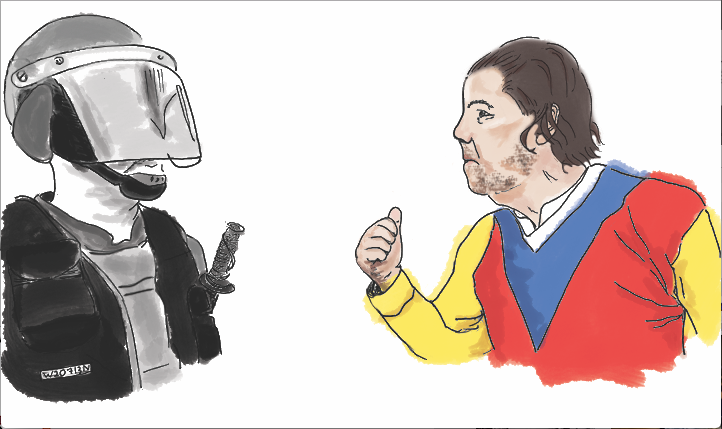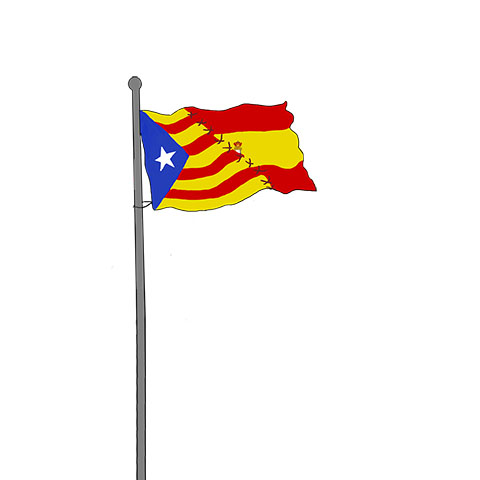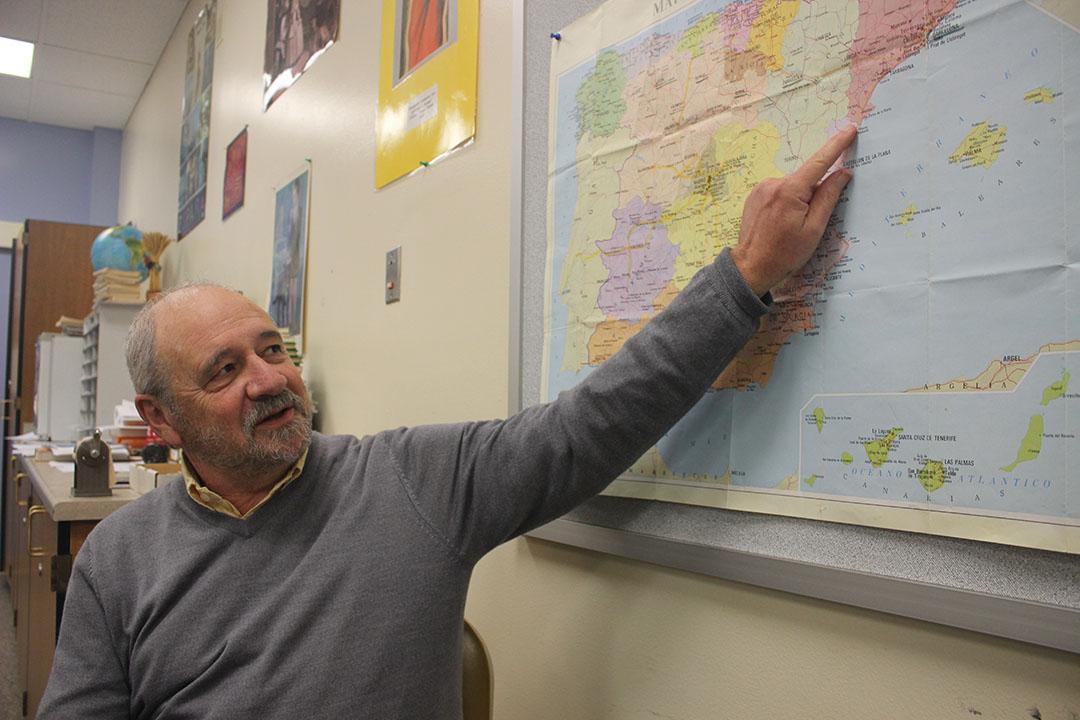Josep Vericat remembers a tense morning 41 years ago in a small police station office in the Catalonia region of Spain; a pistol upon the table served as the only barrier between him and the uniformed policeman peppering him with questions.
Now a Spanish teacher at Palo Alto High School, Vericat was once detained by police for helping organize La Marxa det la Libertat — Catalan for the “The March for Freedom” — in 1976.
The march never made it to the streets, as the government cracked down, detaining, interrogating, fining and jailing several of the organizers. On the day of the march, Vericat’s small town of Ulldecona was practically swarming with police. In his native Spanish, he recalls sitting alongside his friends in front of the local police station watching the scene unfold.
Although their struggle never came to fruition, the organizers regarded their march as a historic moment and as the start of a new democratic era, according to Vericat.
“That [march] was in a way the beginning of the desire to control your own destiny in any form, not necessarily through independence,” Vericat says.
But independence was on every Catalan’s mind four decades later, during the Catalan independence referendum on Oct. 1, 2017. It was on this day that more than two million people took to the streets of Catalonia to vote for or against their secession from Spain. The central government of Spain declared the referendum unconstitutional, and deployed government police to disperse the voters with rubber bullets and batons.
“Putting a paper inside a box? That’s rebellious? That’s what doesn’t make sense to me.”
– Paula Rodena, former Paly student
A digital paper trail of pictures and videos, taken by news organizations such as BBC and Reuters, captures the brutality. In one example, a woman’s fingers are nearly broken before she is dropped down a flight of stairs. In another, a man suffers a heart attack while police bludgeon his companion.
Vericat joins other current and former Spanish nationals in observing the tension unfolding in Catalonia. Their unique perspectives demonstrate how international conflict stretches across the globe to affect people’s lives.
Taking to the streets
Vericat reacted to the Oct. 1 crackdown with disgust, as did much of the rest of the world.
“For me personally, I felt somewhat nauseous because, while it’s true that the referendum was illegal — because it was not approved by the Spanish government — it’s also true that the people of Catalonia were exercising their fundamental rights, the freedom of expression and the right to demonstrate,” Vericat says.
Former Paly student Paula Rodena, who moved back to Barcelona after her freshman year, shares a similar sentiment.
“What have we done?” Rodena asks. “Putting a paper inside a box? That’s rebellious? That’s what doesn’t make sense to me.”
Rodena found an outlet for her outrage in political activism. She enjoys the sense of solidarity that protests instill, and appreciates the opportunity to meet new people.
“We do the protest basically to show the Spanish government how we’re not afraid,” Rodena says. “They’re going to eliminate the Catalan constitution? Fine. We’re not afraid. … We don’t get independence? We’re not going to stop.”

Catalan officials stated that more than 800 people were injured on Oct. 1. Videos of police dragging voters by their hair, beating crowds of people and smashing their way into polling stations went viral and sparked worldwide criticism.
Mainland Spain’s attempts to play down the damage only exacerbated the situation, according to Professor Joan Ramon Resina, an expert on Catalan culture at Stanford University.
“There were hundreds of people treated for wounds and Spanish sources said only two people were hurt,” Resina says. “You might have seen pictures of elderly people bleeding … People have seen those images, but the Madrid press claimed they were fake. Fake, like made in a studio?”
Resina believes that this misrepresentation is a result of Spain’s history of antagonizing the Catalan region.
“They [the Spanish] claim Catalonia is part of Spain and yet they treat Catalans as non-Spaniards … as some kind of second-class citizens,” Resina says.
At an impasse
With neither government budging and tensions rising, many Catalans, as well people from outside the region, are calling for dialogue.
“Each of them has taken an extreme position; the [Spanish] government doesn’t want to negotiate in any way and the government of Catalonia only proposes ‘yes or yes’ in a referendum,” Vericat says. “They are in two opposing positions with no chance of dialogue.”
Pro-independence parties have been criticized for downplaying the obstacles and responsibilities that come with being an independent nation.
“It’s [secession’s] like someone’s arm has been cut off. I don’t want Catalonia to separate because I don’t want my arm to be cut off.”
– Pilar Badillo, Spanish teacher
“It’s one thing to declare independence, you can do this tomorrow or Saturday, but it’s another to actually gain independence,” Vericat says. “To be independent means that powerful countries around the world will support and recognize you, and right now in Europe no one can support them [Catalonia].”
Also speaking in Spanish, Pilar Badillo, a Paly Spanish teacher originally from Madrid, worries that the movement for independence lacks a clear understanding of the repercussions and responsibilities that come with secession.
“I do not think Catalonia should be independent,” Badillo says, “I think that they should have a lot of autonomy, they should have their own language, their own institutions, but I do not think it should be independent.”
For Badillo, Spain gains power and diversity from its 17 autonomous, culturally and linguistically distinct regions.
“For me it’s like someone’s arm has been cut off,” Pilar Badillo says. “I don’t want Catalonia to separate because I don’t want my arm to be cut off.”
Many see and understand the conflict in Spain as a direct struggle between the central government of Spain against that of Catalonia, but Badillo sees it differently.
“The government is in the center of the country, but it’s not the government of the center, it’s the government of all of Spain,” says Badillo. “That’s what people don’t understand.”

The Long Road Ahead
Even as the next generation of Catalans wave the banner of freedom, Vericat thinks independence remains out of reach — at least for now.
“Being someone who has always dreamed of the independence of Catalonia, I know that right now, in this current historical and political juncture, it [independence] is practically impossible,” Vericat says.
Catalonia’s formal declaration of independence on Oct. 27 was met with immediate opposition as the Spanish Parliament invoked its constitutional right to dissolve the Catalonian government. The former Catalan president, as well as many of his cabinet members, have fled to Belgium where they remain in exile, having been charged with rebellion, sedition, and embezzlement of public funds.
Perhaps Catalonia will eventually prevail, leading it, and the rest of Spain, to an uncertain future. Or perhaps its dreams of independence will be buried, only to be unearthed by the next wave of activism. By the time we know for sure, however, the independence movement will have cemented itself in the memories of people like Vericat — and in modern history.



